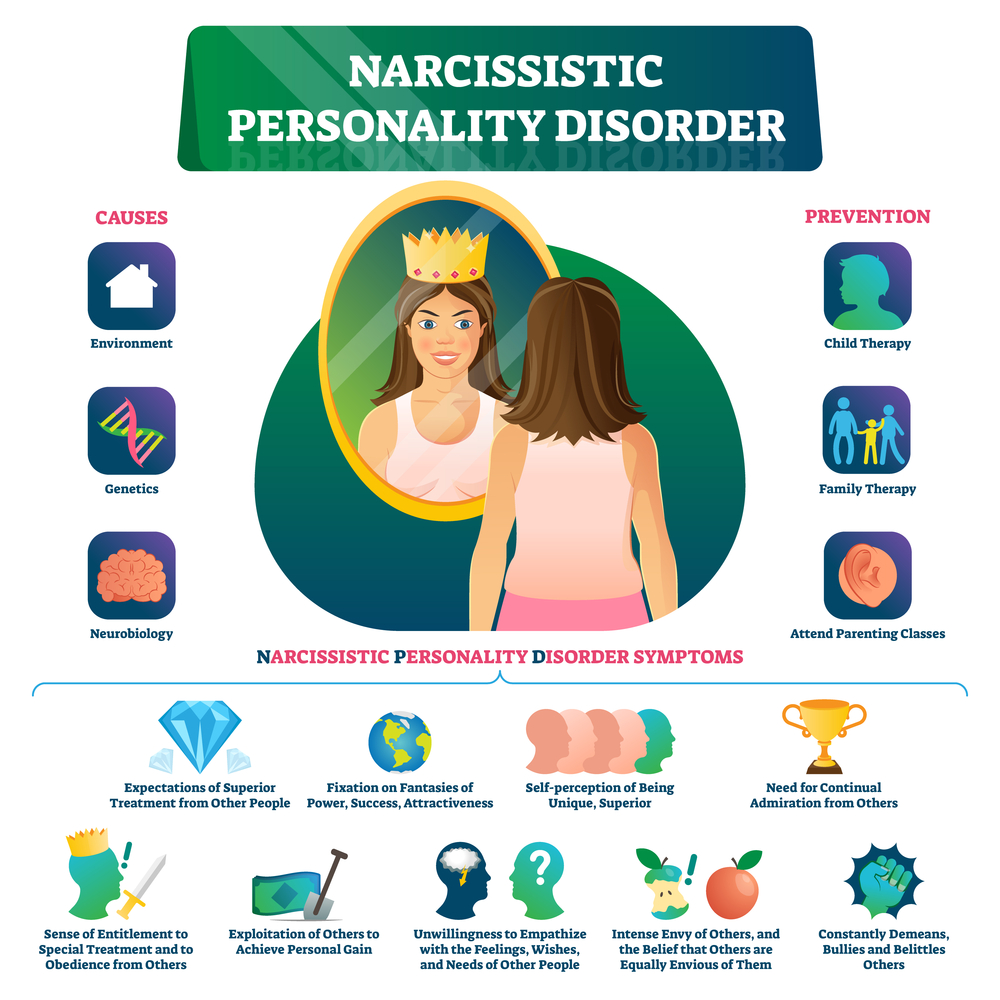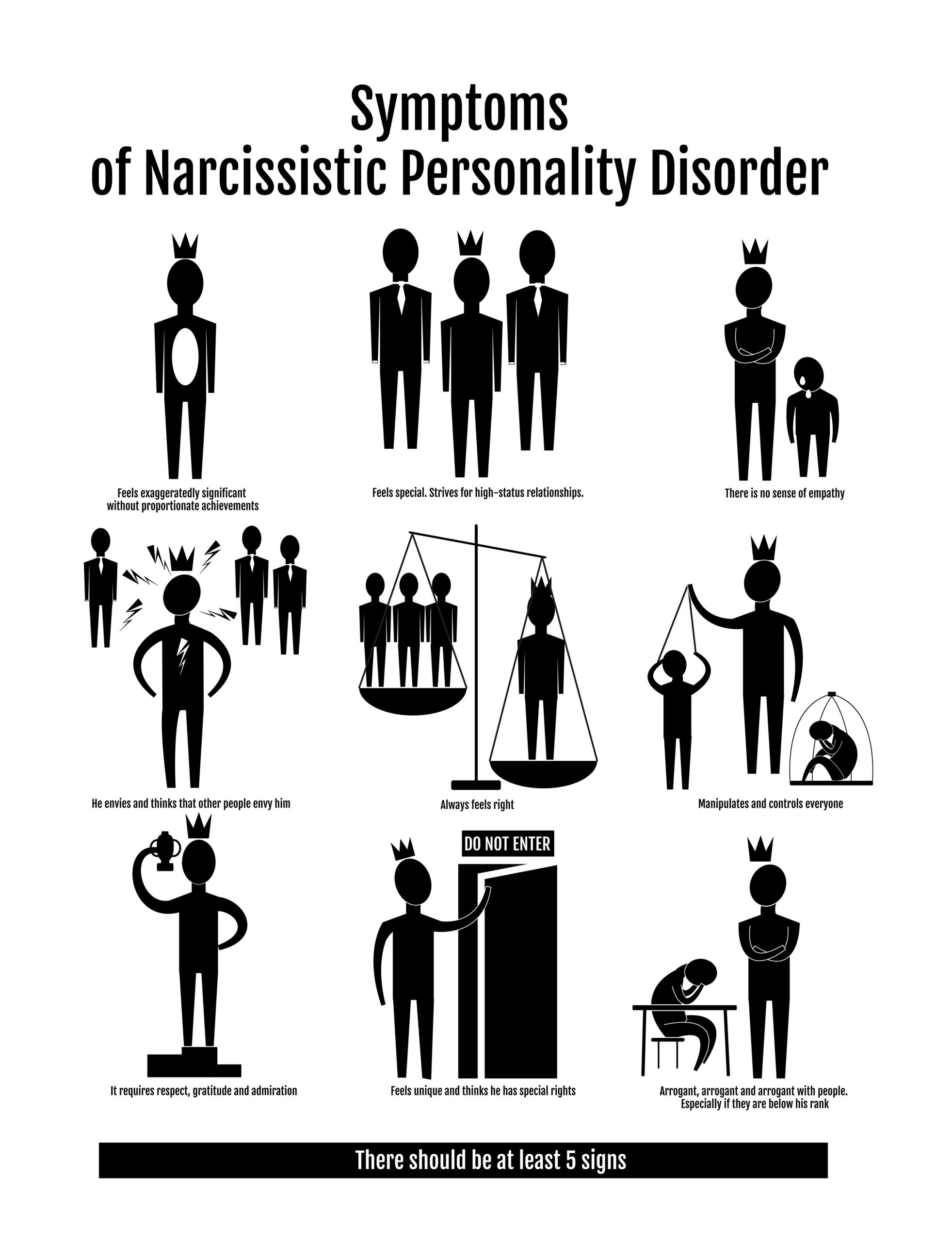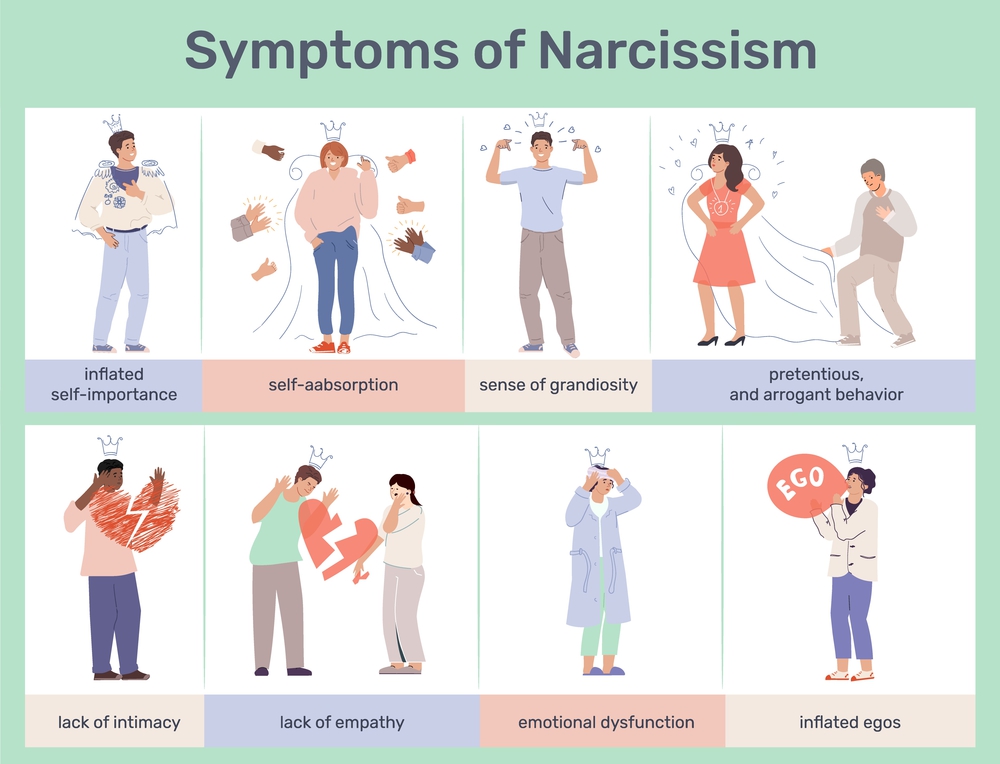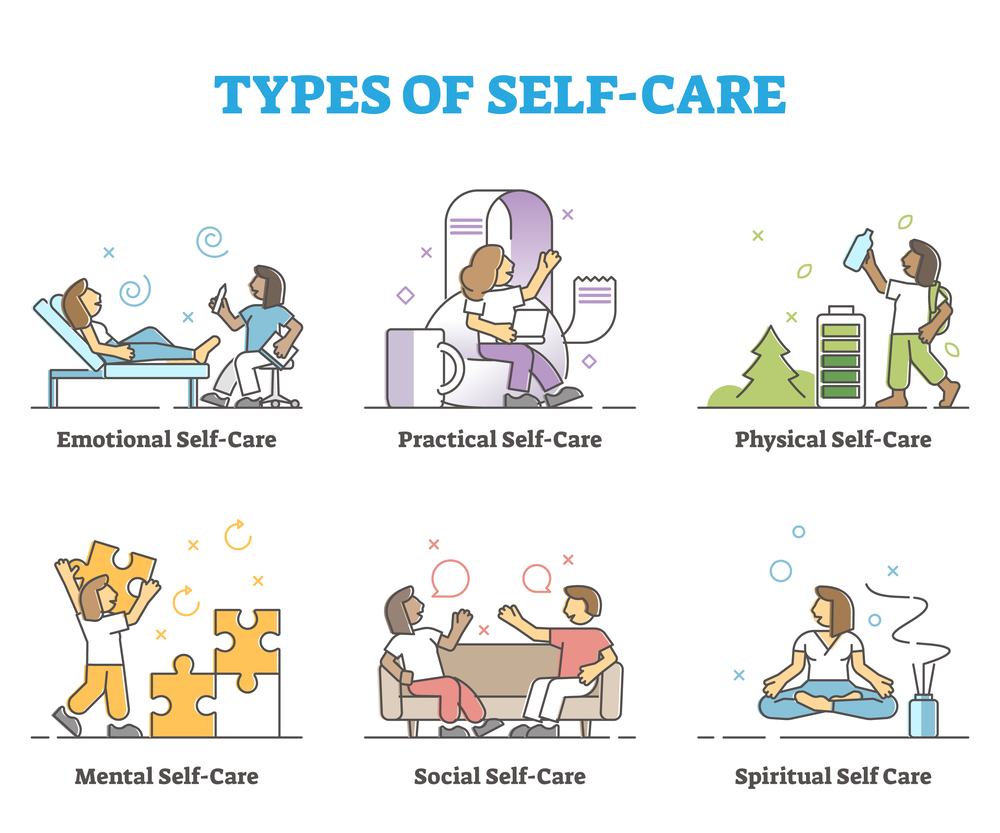Surviving a Relationship with a Narcissist: Essential Tips
 Navigating a relationship with a narcissist can often feel like you're walking through a minefield blindfolded. The unpredictability, the emotional rollercoaster, the constant questioning of your sanity – it's a journey that's as exhausting as it is confusing. For those who have lived this reality, you know it's not just about enduring; it's about finding […]
Navigating a relationship with a narcissist can often feel like you're walking through a minefield blindfolded. The unpredictability, the emotional rollercoaster, the constant questioning of your sanity – it's a journey that's as exhausting as it is confusing. For those who have lived this reality, you know it's not just about enduring; it's about finding […]Navigating a relationship with a narcissist can often feel like you're walking through a minefield blindfolded. The unpredictability, the emotional rollercoaster, the constant questioning of your sanity – it's a journey that's as exhausting as it is confusing. For those who have lived this reality, you know it's not just about enduring; it's about finding ways to survive and eventually heal and thrive.
In this blog post, we will embark on a journey of understanding and empowerment, beginning with Identifying Narcissistic Behavior. Recognizing the patterns is the first critical step in addressing the situation. From there, we'll explore Setting Boundaries for Self-Protection. It's essential to establish limits to safeguard your emotional well-being.
We'll then delve into Nurturing Your Self-Esteem. A relationship with a narcissist can severely impact how you view yourself, and rebuilding your self-esteem is crucial for your recovery. Alongside this, we'll discuss Effective Communication Strategies because sometimes, the right words can be your strongest shield.
Seeking Support from Trusted Individuals is another key aspect we'll cover. You don't have to face this alone; support networks can immensely help. As we move towards healing, Rebuilding Your Life After Narcissistic Abuse is a vital chapter, focusing on piecing together a life that might have been shattered.
Lastly, we emphasize the importance of Practicing Self-Care and Wellness. Healing is as much about nurturing your body and mind as it is about emotional recovery.
This blog post is more than just a guide; it's a companion for those who feel lost in the maze of a narcissistic relationship. It's about finding your way back to yourself, reclaiming your power, and rediscovering the strength you always had within. Let's embark on this journey together with courage and hope.

Identifying Narcissistic Behavior
Understanding the behavior of a narcissist is crucial for anyone involved in such a relationship. It's the first step in regaining control of your life and emotional well-being.
Classic Traits of a Narcissist
Narcissists often exude a sense of grandiosity and self-importance. They may be absorbed in fantasies of success, power, brilliance, beauty, or ideal love, believing they are unique and can only be understood by or associated with other special people or institutions. This exaggerated sense of self often leads to arrogance in interpersonal relationships.
Impact on Relationships
The presence of narcissistic traits in a relationship can create a significant imbalance. The narcissist's needs and desires are often prioritized, leading to a one-sided relationship dynamic. Anyone in a relationship with a narcissist may feel marginalized, undervalued, and unheard, leading to a sense of emotional abandonment.
Manipulation Tactics
Narcissists are known for their manipulation tactics, which can include gaslighting. In this psychological tactic, the narcissist denies or distorts reality, causing their partner to doubt their memory, perception, or sanity. Other tactics may include passive-aggressive behavior, guilt-tripping, and shifting blame to avoid accountability.
 Setting Boundaries for Self-Protection
Setting Boundaries for Self-Protection
Establishing boundaries is a vital step in protecting yourself from the negative impacts of a relationship with a narcissist. It helps in maintaining your self-respect and emotional health.
Importance of Firm Boundaries
Setting boundaries is essential in any relationship, but it's especially crucial when dealing with a narcissist. These boundaries help protect your sense of self-worth and limit the narcissist's ability to inflict emotional and psychological harm. They serve as a clear statement of your needs and expectations.
Challenges in Boundary Setting
While setting boundaries is essential, it's not always easy, especially with a narcissist who may view these boundaries as a challenge to their control. Be prepared for resistance. Narcissists may react with anger, dismissal, or further manipulative behaviors when their attempts to control are thwarted.
Nurturing Your Self-Esteem
Rebuilding and nurturing your self-esteem is essential after experiencing narcissistic abuse. This process helps in healing from the emotional damage and regaining confidence.
Rebuilding Self-Worth
The abuse from a relationship with a narcissist can severely damage your self-esteem, often leading to feelings of worthlessness or inadequacy. Actively working on rebuilding your self-worth is crucial. This can involve engaging in activities that make you feel good about yourself, seeking validation from within rather than from the narcissistic partner, and focusing on your strengths and accomplishments.
Affirmations and Positive Self-Talk
Daily affirmations and positive self-talk can significantly aid in restoring and strengthening your self-esteem. These practices help rewire any negative thought patterns instilled by the narcissist and reinforce your sense of value and self-worth. Positive affirmations remind you of your strengths, capabilities, and worth, gradually rebuilding the self-esteem that the narcissistic relationship may have eroded.
 Effective Communication Strategies
Effective Communication Strategies
Communicating effectively with a narcissist is challenging but essential for protecting your emotional health. Approaching these interactions with the right strategies is key to maintaining your well-being.
Approaching Conversations with Clarity
When talking with a narcissist, it's important to be clear and concise in your communication. Avoid ambiguity, as it can lead to misunderstandings or manipulative opportunities for the narcissist. Speak with confidence and assertiveness, ensuring your points are clear and direct.
Maintaining Emotional Control
Keeping your emotions in check is crucial when engaging in conversations with a narcissist. They may use emotional reactions to their advantage, so remaining calm and composed is important. This approach reduces the risk of getting drawn into unproductive or emotionally charged arguments.
Recognizing Unproductive Discussions
Not all conversations with a narcissist will be productive or healthy. Recognizing the signs of a conversation turning unproductive or harmful is vital. If the discussion is going in circles, becoming overly aggressive, or if the narcissist starts to gaslight, it's often best to disengage and step back.
Seeking Support from Trusted Individuals
Enduring a relationship with a narcissist can feel lonely, but reaching out for support can make a significant difference. Building a network of support is a powerful step in your healing journey.
Finding Emotional Support
Turn to friends, family, and professional counselors for support. These individuals can offer the emotional backing, understanding, and guidance you need. They can provide a listening ear, advice, or simply a safe space to express your feelings and experiences.
The Power of Support Groups
Joining support groups specifically for those who have experienced narcissistic abuse can be incredibly beneficial. These groups offer a community of individuals who understand what you're going through. Sharing experiences, coping strategies, and words of encouragement can significantly aid your healing process.
 Rebuilding Your Life After Narcissistic Abuse
Rebuilding Your Life After Narcissistic Abuse
Starting over after leaving a narcissistic relationship marks a new chapter in your life. It's a time for healing, rediscovering yourself, and building a positive future.
Emotional and Mental Renewal
Begin by focusing on your emotional and mental recovery. This may involve therapy, self-reflection, or other forms of emotional healing. Acknowledge the hurt and pain, but also look forward to rebuilding a life free from abuse.
Rediscovering Yourself
In the aftermath of a relationship with a narcissist, it’s important to reconnect with yourself. Explore your interests, hobbies, and passions you might have neglected. Engaging in activities that bring you joy and fulfillment is crucial to rebuilding your identity and self-worth.
Creating a Supportive Environment
Finally, focus on creating a living environment that supports your recovery and growth. Surround yourself with positive influences, whether that's supportive people, a comfortable living space, or engaging in positive activities. This environment should be a sanctuary for your ongoing healing and personal growth.
 Practicing Self-Care and Wellness
Practicing Self-Care and Wellness
Engaging in self-care is a powerful tool for healing from the effects of narcissistic abuse. Prioritizing your mental and physical health is critical to recovery.
Mental and Physical Health Activities
Incorporating activities that boost mental and physical health is crucial. Regular exercise improves physical health and enhances mental well-being by reducing stress, anxiety, and depression. Healthy eating habits support your physical health, which is often compromised in stressful relationships. A balanced diet contributes to improved mood and energy levels.
Mindfulness and Meditation
Mindfulness practices and meditation are excellent for achieving calm and inner peace. These practices help center your thoughts, manage stress, and foster a sense of well-being. They allow you to connect with your inner self, offering clarity and tranquility amid recovery.

Understanding the Cycle of Narcissistic Abuse
Recognizing the cycle of abuse in a narcissistic relationship is essential for breaking free from its patterns. This understanding is a significant step in empowerment and healing.
Phases of Narcissistic Relationships
Narcissistic relationships typically follow a predictable cycle. The initial phase, known as the idealization phase, is often characterized by intense admiration and attention from the narcissist. The relationship then shifts to devaluation, where the partner is belittled and demeaned. Finally, the relationship moves into the discard phase, where the narcissist may end the relationship or emotionally withdraw. Recognizing these phases helps in identifying and understanding the abuse.
Breaking the Cycle
Breaking the cycle of narcissistic abuse requires empowerment and decisive action. This involves recognizing the signs of abuse, understanding your worth, and making firm decisions about your relationship. It often entails seeking support, setting boundaries, and, in many cases, leaving the relationship. Empowerment comes from recognizing your right to a healthy, respectful relationship and taking steps to ensure your well-being.
Handling Financial and Legal Issues
Managing finances and legal matters is crucial in regaining independence from a narcissistic partner. It's an empowering step towards a secure and autonomous life.
Financial Independence
Achieving financial independence is a critical aspect of separating from a narcissistic partner. This involves taking control of your financial resources, understanding your income and expenses, and making plans for your financial future. It may include opening individual bank accounts, establishing credit in your name, and creating a budget that supports your independence.
Seeking Legal Advice
Understanding your legal rights is essential, especially in cases involving shared assets or custody issues. Seeking advice from legal professionals can provide clarity on your rights and options. Legal counsel can guide you through separation or divorce, helping you make informed decisions that protect your interests and those of any children involved.
Creating a Safety Plan
Ensuring your safety is the most crucial consideration when leaving a narcissistic relationship. A well-thought-out safety plan is essential for protecting yourself both physically and emotionally.
Strategies for Physical and Emotional Safety
Your safety plan should include physical and emotional protection strategies. This may involve identifying safe places to stay, securing personal documents, and having a trusted person you can contact in emergencies. Emotional safety includes strategies for managing stress and trauma, such as therapy or support groups.
Establishing a Secure Post-Separation Life
The plan should also outline steps for establishing a secure life after separation. This includes setting up independent living arrangements, securing financial resources, and building a supportive network of friends and family. The goal is to create a stable and safe environment where you can rebuild and thrive post-separation.

Developing Emotional Resilience
Building emotional resilience is vital to coping with the challenges of being in a relationship with a narcissist. Strengthening your emotional core helps you to withstand and recover from psychological stress.
Emotional Resilience Techniques
Practicing emotional resilience involves learning to manage your feelings and reactions. Techniques include mindfulness, cognitive reframing (changing your perspective on situations), and developing a strong sense of self that is independent of the narcissist's influence. These skills can help you maintain emotional balance and reduce the impact of the narcissist's behavior on your well-being.
Avoiding Reactive Behaviors
Reacting impulsively to a narcissist's provocations can exacerbate conflicts and emotional upheaval. Developing a strategy to respond calmly and assertively, rather than reactively, can help in maintaining your composure and reducing the power the narcissist holds over your emotions.
Educating Yourself About Narcissism
Understanding the psychological underpinnings of narcissism can empower you to deal with a narcissistic partner more effectively. Knowledge is power, and it helps in developing effective coping strategies.
Learning About Narcissism
Educating yourself about narcissism, its causes, and its manifestations can help you better understand the motivations and behaviors of your narcissistic partner. This knowledge can demystify their actions and reduce their emotional impact on you.
Professional Guidance
Seeking advice from a psychologist or a therapist who specializes in narcissistic behavior can provide valuable insights and coping mechanisms. They can offer guidance tailored to your specific situation, helping you navigate the challenges of the relationship.
Expanding Personal Growth and Development
Investing in your personal growth and development can shift the focus from the narcissist to your journey of self-improvement. This shift is crucial for maintaining a sense of identity and purpose.
Personal Goals and Interests
Engaging in activities that promote personal growth, such as education, hobbies, or career advancement, can provide a sense of achievement and fulfillment. Pursuing your interests helps in building a life that is not solely defined by your relationship with the narcissist.
Building Confidence and Self-Efficacy
Working on your confidence and belief in your ability to overcome challenges (self-efficacy) can empower you in the relationship. This might involve setting small, achievable goals and celebrating your successes, which can boost your confidence and reduce dependence on the narcissist for validation.
Utilizing Technology for Support
Technology offers various tools and resources for those dealing with narcissistic relationships. Online platforms can be a source of support and information.
Online Support Groups and Resources
Joining online forums or support groups can provide access to a community of individuals who share similar experiences. These platforms offer a space to seek advice, share stories, and gain emotional support from others who understand what you're going through.
Educational Materials and Apps
There are numerous online resources, including articles, podcasts, and mobile apps focused on dealing with narcissistic relationships. These resources can offer strategies for coping and provide a deeper understanding of your situation. Apps might include meditation and mindfulness apps to help manage stress and anxiety.
Documenting and Reflecting on the Relationship
Keeping a journal or a record of your experiences in the relationship can be a therapeutic tool. It can also serve as a reality check when you need to remind yourself of the reasons you are seeking change.
Journaling for Reflection and Clarity
Writing down your thoughts and experiences helps you process your emotions and clarify the relationship dynamics. It can also serve as a form of self-expression and a way to track your emotional journey and growth.
Recording Incidents
In some cases, keeping a record of incidents can be helpful, especially if legal issues arise or if you need to remind yourself of the realities of the relationship. This record can be a factual account of your observed events, conversations, and behaviors.
Embracing Hope and Strength in Your Recovery Journey
Surviving a relationship with a narcissist requires courage, strength, and the right strategies. Remember, prioritizing self-care and developing a solid support system are key to your recovery and well-being. Embrace hope and resilience, and know that a brighter, healthier future is within reach.

